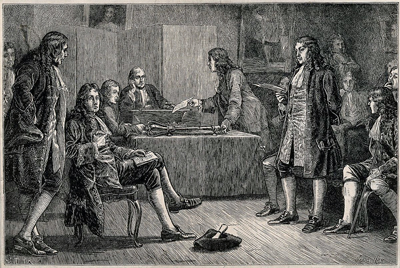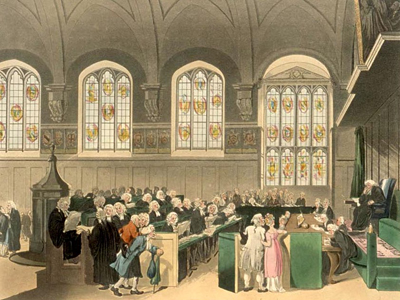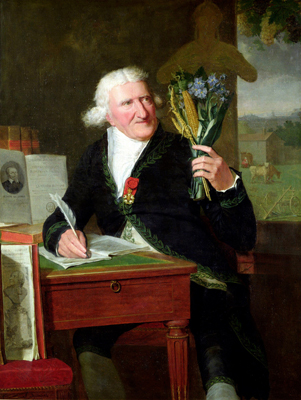5 Huge Science Finds (That Got Held Back For Stupid Reasons)

We tell kids that if they work hard enough, they can change the world. But maybe we need to add a caveat: If you're on the verge of a groundbreaking innovation, a bunch of bozos will stop at nothing to destroy you because they fundamentally misunderstand what you're trying to accomplish. For example...
Florence Banned Arabic Numerals For Fear They'd Be Used For Crime
For centuries, Europe did math with Roman numerals, until the Muslim world exposed European merchants to the Hindu-Arabic numeral system. They immediately noticed that it was easier to add 2847 + 728 than MMDCCCXLVII + DCCXXVIII, and that the system also opened up more options in calculus and engineering, thanks to crazy concepts like a notation for zero. The achievements of modern mathematics wouldn't exist without good old zero to nine.

However, the complete switchover took until around the 16th century, and in the early days, the Florentine government firmly rejected any change to Arabic numerals. Their rationale was that the confusing new symbols would lead to people forging financial statements, because a zero could easily be made to look like, say, a six. They also feared the numerals would encourage rampant money-lending, because the system could be used to calculate to more decimal places (and thus more interest) than the mere two points of the Roman one. It was assumed that the only people who'd benefit from Arabic numerals would be criminals suckering idiots into debt and forgeries. So some merchants used them in secret coded messages, marking the only time in history when people wrote "BOOBS," then turned the paper upside down to giggle at the numbers.
An influential cadre of professional abacus wielders also had a hand in the delay: Since the new numbers made math far easier, they worried that they'd lose business, and their union would become obsolete. Abacists and algorists held fierce debates, and for a while abacus users won out, thanks to the support of the Church, and lobbying that would make the NRA jealous. It would be like if Netflix was invented, but no one was allowed to use it until 2173 thanks to the all-powerful White-House-backed Blockbuster lobby.
The Father Of Scientific Journalism Was Locked Up As A Spy
Peer review works by enlisting scholars to separate the worthy material from garbage with less scientific value than Alex Jones' boner pills. The backbone of modern science was first implemented in the 17th century by Henry Oldenburg, a member of the Royal Society, which was essentially a clubhouse for the smartest men in England.

Oldenburg sought worthwhile research and papers for publication in his periodical, Philosophical Transactions, which was Isaac Newton's preferred bathroom reading material. To accomplish this, Oldenburg corresponded and shared detailed reports of news, scientific data, blueprints, and technological research with foreign intellectuals like Cassini, Huygens, Spinoza, and Leeuwenhoek to analyze and verify the facts of the day. And for his trouble, Oldenburg was locked up in 1667 as a suspected spy.
Oldenburg had been sharing and seeking information on subjects ranging from how a bee's stinger works to bacteria, philosophy, meteorology, and watch design. Unless he and his pen pals were secretly working on a weaponized beehive or had an elaborate weather-and-clock-based secret code, it's a fair guess that he was not, in fact, a national security threat. But because the Second Anglo-Dutch War was in full swing, circumstantial evidence was all the authorities needed to prove that talking with non-British people was a sign of treason.

Oldenburg begged for the assistance of anyone who could get him out of the Tower of London, but his protests were ignored. The British government couldn't even be bothered to charge him with anything, and eventually let him out (well, after a couple months). Oldenburg went right back to sending letters, and his ideas have since been adapted by every reputable science publication in human history. So that's a little bit of all right. Probably doesn't take the edge off of prison, though.
The True Cause Of Ulcers Was Discredited By Big Antacid
It wasn't long ago that doctors were baffled by gastric disorders. "Gastric cripples" -- supposedly cured patients, left with severe pain and no appetite due to holes caused by excessive acid in their stomachs -- were especially befuddling. Ulcers were basically considered the result of stress, too much spicy food, and maybe witches -- who the hell knows? But in the 1980s, Australian microbiologist Barry Marshall and pathologist Robin Warren analyzed patient records to discover that the vast majority of ulcers were linked to a specific bacteria: Helicobacter pylori, which could be counteracted by a mundane prescription of antibiotics.

But stress as the cause of ulcers was such firmly established wisdom that no other explanation would be entertained. Doctors refuting the bacteria theory cited a single study wherein researchers tied up rats in tiny little straitjackets and dunked them in frigid water until ulcers were induced (science!). The gastroenterology community stuck by the stress theory despite some pretty astounding data demonstrating otherwise, and as long as Marshall and Warren refrained from waterboarding rodents, they stood little chance of changing anyone's mind.

A logical, if depressing argument is that doctors didn't want to risk losing perks and future research grants from drug companies, as the pharmaceutical industry had an entire antacid empire. And so, taking a cue from every neglected child who can only get their parent's attention by holding their breath until they pass out, Marshall gulped down a vial of bacteria to give himself severe gastritis. He spent two painful weeks vomiting while endoscopies proved that his insides were indeed getting super messed up by Helicobacter pylori. Antibiotics then set things right, and Marshall got the Nobel Prize for his efforts, hopefully followed by some nice soothing ice cream.
A Single Word Got Cybernetics Outlawed In The Soviet Union
If you ask the average person what "cybernetics" are, they'll probably say something about the Terminator, but it's actually a catchall term for everything from algorithms to artificial intelligence, from robots to self-driving cars. It's an important branch of technology that was frowned upon in the Soviet Union, all because an American cybernetics scholar defined the word "information" differently than Marxism-Leninism.
To Soviet leaders, this meant that the entire emerging field -- at the time, a key part of improving anti-aircraft defense systems -- was reduced to a pseudoscientific capitalist ploy. Russian ideologues warned that America would swap untrustworthy workers with "thinking machines" that would do their bidding blindly -- a conclusion reached not from reading academic papers, but skimming a trippy-looking cover of Time that featured a hat-wearing computer performing a human's job.

Another Soviet bureaucrat, wildly misinterpreting a book he didn't read, believed artificial intelligence meant that "a larger part of humanity must be exterminated" by IBM to make room for robots. So while the United States had its Red Scare, the USSR had a robot panic.
Soviet scientists dodged the ban by simply doing the same work under a different name. The USSR's computing community survived by using code words, like teenagers trying to keep their texts private. "Information" became "data," "memory" became "storage," and an influential paper called "Mathematical Theory of Communication" became the sufficiently dull "The Statistical Theory of Electrical Signal Transmission." The goal was to replace any term that could be tied to a more ideological field of study, like "logic" and its association with philosophy, with a purely technical term. By the time the hardcore opponents of cybernetics dropped dead, or lost power in the '60s, cybernetics was already integrated throughout Soviet military and economic systems. And shockingly, they somehow never produced a Red Skynet.
Starving French Peasants Had To Be Duped Into Eating Potatoes
The Western world now considers potatoes to be a food group of their own, but when they were first introduced to Europe, people refused to grow or eat them. They were suspected to be toxic, or satanic, or part of a Catholic plot, and soon became associated with witchcraft and leprosy. At one point they were flat out banned in France.

But potatoes had lots of carbs, making them perfect for malnourished peasants. During a 1744 Prussian famine, Frederick the Great ("a potato enthusiast") had to order his subjects to eat what was previously considered food barely fit for hogs. And Prussia's love for potatoes would influence Antoine-Augustin Parmentier, who was like Jacques Potatoseed crossed with Machiavelli.
Parmentier was captured five times during the Seven Years' War, and during his multiple stints in prison, he discovered that a potato-heavy diet kept him in good health and barely caused him to worship Satan at all. Figuring that he might make a better agronomist than a soldier, Parmentier dedicated himself to spreading the good word of the potato when the war was over.

And it was a good thing he did, because in the 18th century, France was better known for disastrous wheat famines than fine wines. In the late 1770s, bread prices shot up, sparking widespread hunger and civil unrest. Parmentier was convinced that the easy-to-grow potato could ease the hungry masses, so he launched an all-out PR campaign.
Parmentier basically tricked French peasants into not dying. He threw potato-themed dinner parties for high society, convinced none other than Marie Antoinette to wear potato flowers in her hair, and had armed guards posted around the potato fields outside Paris to make people wonder what was in there that could be worth stealing. Once the potatoes were ready for harvest, Parmentier withdrew the guards -- fully anticipating thieving villagers, bent on conspicuous consumption first, and nutrition a distant second. Yes, the potato rebranded itself with celebrity star power and viral marketing long before John Cena and Crocs.
Parmentier failed to avert a revolution, but he did save a few million people from starvation. Within a generation, every class in France was stuffing its faces with spuds, European agriculture was revolutionized, and today it's hard to imagine a diet without the potato, even if sometimes we really, really should.
Don't hold back your own discovery, get a legit microscope!
Support your favorite Cracked writers with a visit to our Contribution Page. Please and thank you.
For more, check out 8 Hilarious Historical Fears That Seriously Delayed Progress and The 6 Most Insane Moral Panics In American History.
Also, we'd love to know more about you and your interesting lives, dear readers. If you spend your days doing cool stuff, drop us a line at iDoCoolStuff at Cracked dot com, and maybe we can share your story with the entire internet.
Follow us on Facebook ... if you dare.